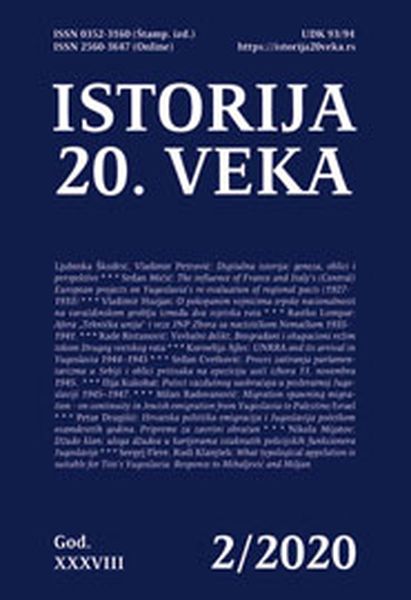VERBALNI DELIKT, BEOGRAĐANI I OKUPACIONI REŽIM TOKOM DRUGOG SVETSKOG RATA
VERBAL DELICT, CITIZENS OF BELGRADE AND OCCUPATION REGIME DURING WORLD WAR II
Author(s): Rade RistanovićSubject(s): History, History of ideas, Political history, Recent History (1900 till today)
Published by: Institut za savremenu istoriju, Beograd
Keywords: World War II; Belgrade; Propaganda; Censorship; Verbal Delict; Radio London; Repression; Civil Resistance;
Summary/Abstract: The intention of the occupation forces to close off the occupied territory to the flow of information that would prevent the citizens of Belgrade from being informed using other channels, experienced failure. The citizens of this city listened intensely to forbidden radio stations and transmitted information by word of mouth. Occupiers, collaborators, allies, resistance movements, and crimes in the NDH were dominant themes in Belgrade's illegal discourse. The emergence of national poets writing poems with a political connotation was entirely in accordance with the tradition of the Serbian people. We can see clearly that Belgrade restaurants, in this period, also served as a kind of news agency, where one could get all kinds of information or listen to banned songs. Markets, streets, and other places of gathering, where informal conversations were held, were sources where Belgrade citizens could get in touch with forbidden information. Individual examples of violations of a verbal delict, such as Aleksandar Ignjatović, a watchmaker and Leontina Kraus, a teacher, show that there were people among citizens who were not afraid of the repressive measures and threats by the occupation forces and who risked and lost their lives to defend the dignity of the occupied Serbian population. From the very first day, the occupier emphasized that listening to banned radio stations and conducting anti-occupation propaganda would undergo severe punishment. Police and security institutions used a network of associates and police commissioners on the field to prevent this phenomenon and reveal the offenders. Many cases were also discovered on the base of information collected from denunciations. After the investigation, some of the arrested were shot, while others were put into concentration camps or got lighter sentences, which proves that the repressive system did not have unified punishment maintenance. Parallel with police operations, the occupier acted preventively using propaganda. This way the regime intended to intimidate those who spread forbidden news. The need for the implementation of these acts of repression and propaganda is a good example that proves that a lot of people listened to forbidden radio stations and violated verbal delict. Despite the fact that listening to forbidden radio stations and violating the verbal delict was not in correlation with the achievement of military forces goals of the Allies, this kind of unarmed and civil resistance in Belgrade was of great importance. Firstly, we would like to emphasize its moral value. This kind of behavior represented the main defense against the intentions of the invader to crush fundamental values of a society, such as freedom of speech and the right to be informed. Anti-occupation rhetoric speeches compromised the regime and had negative influence on the tendency of the occupier to get the support of the domestic population by use of propaganda, which was one of preconditions for pacification and the exploitation of the occupied territory. Spontaneous spreading of news criticizing the occupier, accented victories of the Allies and defeats of the Wehrmacht were an equally important factor for the affirmation of organized resistance among the domestic population. Undoubtedly the listening of this news could influence the citizens of Belgrade to „run to the woods“ and participate in organizations or support resistance movements as their sympathizers.
Journal: Istorija 20. veka
- Issue Year: 2020
- Issue No: 2
- Page Range: 103-128
- Page Count: 26
- Language: Serbian

